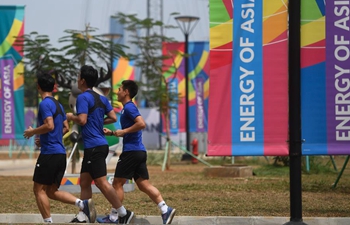
United Nations Secretary-General Antonio Guterres (R) addresses the opening ceremony of a multimedia exhibition: "Surviving Terrorism: Victims' Voices" at the UN headquarters in New York, Aug. 17, 2018. UN Secretary-General Antonio Guterres said Friday that supporting victims and their families of terror attacks is "a moral imperative" based on promoting, protecting and respecting their human rights. (Xinhua/Li Muzi)
UNITED NATIONS, Aug. 17 (Xinhua) -- UN Secretary-General Antonio Guterres said Friday that supporting victims and their families of terror attacks is "a moral imperative" based on promoting, protecting and respecting their human rights.
Addressing the opening ceremony of a multimedia exhibition: "Surviving Terrorism: Victims' Voices," the secretary-general said that "when we lift up the victims and survivors of terrorism, when we listen to their voices, when we respect their rights and provide them with support and justice, we are honoring our common bonds, and reducing the lasting damage done by terrorists to individuals, families and communities."
The exhibition was launched at the UN headquarters in New York to commemorate the first International Day of Remembrance of, and of Tribute to, the Victims of Terrorism to be observed on Aug. 21.
"From Tajikistan to the United Kingdom, from Baghdad to Barcelona, ruthless attacks have shaken us all to the core," said the UN chief.
"But after terrorist attacks, we rarely hear about those who were killed and injured," he said. "Their stories too often go untold. Ordinary women, men, girls and boys, going about their daily lives, attending markets, schools, places of worship, sports events or concerts, or even standing in line to vote, when their lives were ended or changed forever."
"It is time to stop and to listen to the victims and survivors of terrorism. It is time to raise up their voices and recognize the impact terrorism has on their lives," he added.
The UN chief said it is an effective means of countering the evil of terrorism, which aims first and foremost to alienate and to divide societies.
"To support victims and to listen to their voices is a meaningful way for us to prove that we care -- and to negate the terrorists," he said.
"The victims of terrorism are some of the most important voices we have in countering this global menace," he said.
"We can all learn from those who have experienced terrorism. Communities around the world are demonstrating their resilience in response to terrorist attacks. They are countering terrorism and violent extremism in their everyday lives, in their schools and in their places of worship," said the secretary-general.
"Failing to support their calls would be failing in our responsibility to humanity," he noted.
"Terrorism is one of the most challenging issues of our time and a serious threat to international peace and security," said the UN chief, adding that "no country can consider itself immune, with almost every nationality in the world falling victim to terrorist attacks."
Commemorating the forthcoming International Day of Remembrance, and of Tribute to, the Victims of Terrorism "is an opportunity to recognize, honor and support victims and survivors, and to lift up the voices of those left behind," said the UN chief.
Mahmoud Saikal, permanent representative of Afghanistan to the UN, said that in recent years, the average casualty of terror in Afghanistan has been more than 10,000 a year -- "one third of them children."
"Similarly, the basic human rights, which is the right to life, of tens of thousands of people have been severely violated by terrorism around the world -- in Asia Pacific, Africa, Europe, America, and in this beautiful city of New York," he added.
"Most of the time, victims of terrorism are forgotten soon and are left to address their trauma and pick up shattered pieces of their lives by themselves," he noted.
The ambassador explained that was the main reason that Afghanistan initiated the resolution on establishing an international day to remember of, and pay tribute to the victims of terrorism.
He told the participants that Afghanistan is working with other member states on establishing an international support mechanism for victims and survivors of terrorism, especially those who are in desperate need so that "they could enjoy some tangible support from the international community, in putting their lives together."















